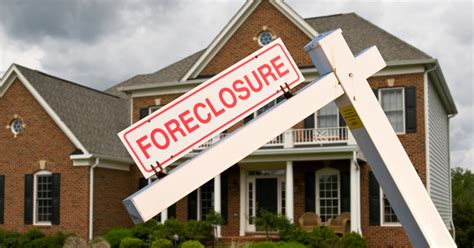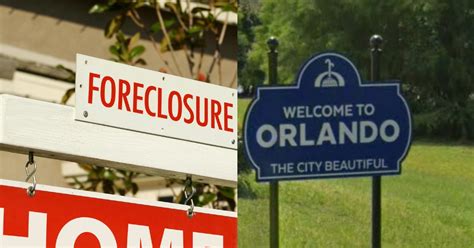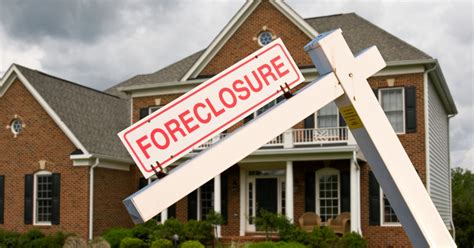
Florida’s Cape Coral-Fort Myers metro area is grappling with the highest foreclosure rate in the United States, fueled by a combination of factors including the aftermath of Hurricane Ian, rising insurance costs, and economic pressures. Despite a relatively strong national housing market, this region stands out as a hotspot of financial distress for homeowners.
Cape Coral-Fort Myers Faces Foreclosure Crisis Amidst National Housing Stability
The Cape Coral-Fort Myers metropolitan area in Florida has emerged as the foreclosure capital of the United States, a stark contrast to the overall stability seen in the national housing market. According to recent data, this region is experiencing a disproportionately high rate of foreclosure filings, driven by a confluence of challenges including the lingering effects of Hurricane Ian, escalating insurance premiums, and broader economic vulnerabilities.
The data reveals a concerning trend: Cape Coral-Fort Myers has the highest foreclosure rate among all metropolitan areas in the country. This means that a significantly larger percentage of homeowners in this region are facing the risk of losing their properties compared to other parts of the United States.
Hurricane Ian’s Lingering Impact
One of the primary drivers of the foreclosure surge is the ongoing impact of Hurricane Ian, which devastated Southwest Florida in September 2022. The hurricane caused widespread damage to homes and infrastructure, leaving many residents struggling to recover. “The destruction caused by Hurricane Ian left many homeowners unable to afford necessary repairs, leading to financial strain and ultimately, foreclosure,” notes a local real estate analyst.
The extensive damage caused by the hurricane has had several direct consequences:
- Uninhabitable Homes: Many homes were rendered uninhabitable due to structural damage, flooding, and mold infestations.
- Repair Costs: Even homes that were not completely destroyed often required significant repairs, placing a heavy financial burden on homeowners.
- Disrupted Employment: The hurricane also disrupted local businesses and employment, leaving many residents without a stable income.
These factors combined have made it difficult for homeowners to keep up with their mortgage payments, contributing to the rise in foreclosure filings. The recovery process has been slow and challenging, leaving many residents in a precarious financial situation.
Rising Insurance Costs: An Additional Burden
Another significant factor contributing to the foreclosure crisis in Cape Coral-Fort Myers is the escalating cost of homeowners insurance. Florida has long been plagued by high insurance rates due to its vulnerability to hurricanes and other natural disasters. However, in recent years, insurance premiums have skyrocketed, making it even more difficult for homeowners to afford their monthly payments.
“The cost of insuring a home in Florida has become prohibitively expensive for many residents,” explains an insurance industry expert. “This is especially true in areas like Cape Coral-Fort Myers, which are particularly susceptible to hurricane damage.”
The rising insurance costs are driven by several factors, including:
- Increased Claims: The frequency and severity of hurricanes have led to a surge in insurance claims, prompting insurers to raise premiums.
- Reinsurance Costs: Insurance companies rely on reinsurance to cover their own losses in the event of a major disaster. The cost of reinsurance has also increased, which is passed on to homeowners in the form of higher premiums.
- Litigation: Florida has a history of high levels of insurance litigation, which adds to the cost of doing business for insurers.
The combination of these factors has created a perfect storm for homeowners in Cape Coral-Fort Myers, making it increasingly difficult to afford their insurance premiums.
Economic Pressures and Housing Market Dynamics
In addition to the direct impacts of Hurricane Ian and rising insurance costs, broader economic pressures are also contributing to the foreclosure crisis in Cape Coral-Fort Myers. While the national economy has shown signs of resilience, certain segments of the population are still struggling with inflation, job insecurity, and other financial challenges.
“The rising cost of living, coupled with stagnant wages, has made it difficult for many families to make ends meet,” says an economist specializing in housing market trends. “This is particularly true in areas like Cape Coral-Fort Myers, where there is a significant population of retirees and low-income workers.”
Moreover, the housing market dynamics in the region are also playing a role. While home values have generally increased nationwide, Cape Coral-Fort Myers has experienced some volatility, particularly in the aftermath of Hurricane Ian. Some homeowners who purchased properties at inflated prices during the housing boom are now finding themselves underwater on their mortgages, meaning they owe more than their homes are worth.
Disparities in Recovery and Assistance
The foreclosure crisis in Cape Coral-Fort Myers is not affecting all residents equally. Certain demographic groups and neighborhoods are experiencing higher rates of foreclosure than others. For example, low-income communities and minority neighborhoods are often disproportionately affected by economic downturns and natural disasters.
“Access to resources and assistance is not always equitable,” notes a community advocate. “Some residents may not be aware of available programs or may face barriers to accessing them.”
Efforts are underway to provide assistance to homeowners facing foreclosure, but there is still a significant need for additional support. Government agencies, non-profit organizations, and community groups are working to provide counseling, legal aid, and financial assistance to those in need. However, the scale of the problem requires a coordinated and sustained response.
A Stark Contrast to National Housing Trends
The foreclosure crisis in Cape Coral-Fort Myers stands in stark contrast to the overall stability and even growth seen in the national housing market. While some areas of the country are experiencing a slowdown in home sales, most regions are not facing the same level of foreclosure pressure as Cape Coral-Fort Myers.
“The national housing market is generally healthy, with low unemployment and rising home values in many areas,” explains a housing market analyst. “However, Cape Coral-Fort Myers is an outlier due to the unique challenges it faces.”
The disparity between the national housing market and the situation in Cape Coral-Fort Myers highlights the importance of understanding local conditions and addressing the specific needs of individual communities. A one-size-fits-all approach to housing policy is not effective in addressing the diverse challenges faced by different regions of the country.
Potential Solutions and Mitigation Strategies
Addressing the foreclosure crisis in Cape Coral-Fort Myers will require a multifaceted approach that tackles the underlying causes of the problem. Some potential solutions and mitigation strategies include:
- Disaster Relief and Recovery Programs: Providing additional funding and resources for disaster relief and recovery efforts can help homeowners repair their homes and rebuild their lives.
- Insurance Reform: Reforming the insurance market to make premiums more affordable and accessible is crucial for protecting homeowners from financial hardship.
- Housing Counseling and Legal Aid: Providing access to housing counseling and legal aid can help homeowners understand their options and navigate the foreclosure process.
- Financial Assistance Programs: Offering financial assistance programs, such as mortgage assistance and rental assistance, can help homeowners stay in their homes and avoid foreclosure.
- Community Development Initiatives: Investing in community development initiatives can help revitalize neighborhoods and create economic opportunities for residents.
By implementing these strategies, policymakers and community leaders can help alleviate the foreclosure crisis in Cape Coral-Fort Myers and create a more resilient and equitable housing market. The response needs to be immediate and long-term to fully address the magnitude of the problem.
Long-Term Implications for the Region
The foreclosure crisis in Cape Coral-Fort Myers has significant long-term implications for the region’s economy, social fabric, and overall quality of life. High foreclosure rates can lead to:
- Depressed Property Values: Foreclosures can depress property values, making it difficult for homeowners to sell their homes and undermining the local economy.
- Increased Crime and Social Instability: Foreclosed properties can become magnets for crime and social unrest, creating challenges for law enforcement and community organizations.
- Erosion of Community Trust: Foreclosures can erode community trust and create a sense of instability and insecurity among residents.
- Strain on Social Services: Increased foreclosure rates can place a strain on social services, such as homeless shelters and food banks, as more families struggle to meet their basic needs.
Addressing the foreclosure crisis is therefore essential for preserving the long-term health and vitality of the Cape Coral-Fort Myers region. It requires a commitment from all stakeholders – government agencies, non-profit organizations, businesses, and residents – to work together to find solutions and build a more sustainable future.
The Human Cost of Foreclosure
Beyond the economic and social implications, the foreclosure crisis in Cape Coral-Fort Myers has a profound human cost. Losing a home can be a traumatic experience for families, leading to stress, anxiety, depression, and other mental health challenges.
“Foreclosure is not just a financial event; it’s a deeply personal and emotional experience,” says a mental health professional. “It can disrupt families, damage relationships, and leave lasting scars.”
Providing support and resources to families facing foreclosure is therefore crucial for mitigating the human cost of the crisis. This includes access to mental health services, counseling, and support groups. It also involves creating a more compassionate and understanding community that recognizes the challenges faced by those who are struggling.
Looking Ahead: Building a More Resilient Future
The foreclosure crisis in Cape Coral-Fort Myers serves as a cautionary tale about the importance of planning for natural disasters, managing risk, and promoting economic opportunity. By learning from this experience, policymakers and community leaders can take steps to build a more resilient and sustainable future for the region.
This includes:
- Investing in Infrastructure: Strengthening infrastructure to withstand future hurricanes and other natural disasters can help protect homes and businesses from damage.
- Promoting Economic Diversification: Diversifying the local economy can reduce reliance on industries that are vulnerable to economic downturns and natural disasters.
- Improving Financial Literacy: Improving financial literacy among residents can help them make informed decisions about their finances and avoid predatory lending practices.
- Strengthening Community Networks: Strengthening community networks can provide support and resources to residents during times of crisis.
By taking these steps, Cape Coral-Fort Myers can emerge from the foreclosure crisis stronger and more resilient than before. The focus must be on proactive measures to reduce vulnerability and promote long-term stability.
Real Estate Market Impact
The high foreclosure rate in the Cape Coral-Fort Myers metro area is exerting downward pressure on the local real estate market, influencing property values and market dynamics. Increased foreclosure inventory can lead to an oversupply of homes for sale, potentially driving down prices and affecting homeowners who may be considering selling.
According to real estate analysts, the increase in foreclosed properties provides more options for potential buyers, particularly investors looking for discounted properties. However, this influx of foreclosures can also destabilize neighborhoods, creating a cycle of decline if not managed effectively. Local real estate agents are reporting longer listing times and increased price negotiations, indicating a shift in market conditions favoring buyers.
Community and Social Services Response
The surge in foreclosures has placed a significant strain on local community and social services. Organizations that provide housing assistance, financial counseling, and legal aid are experiencing increased demand. Many families facing foreclosure require assistance navigating the complex legal processes and accessing resources to mitigate their financial distress.
Community organizations are collaborating with local government agencies to provide comprehensive support services, including foreclosure prevention workshops, financial literacy programs, and emergency assistance funds. These initiatives aim to help homeowners understand their options, negotiate with lenders, and develop strategies to regain financial stability. However, the sheer volume of cases requires additional resources and sustained efforts to meet the growing need.
Government Intervention and Policy Changes
Local and state government agencies are considering policy changes to address the root causes of the foreclosure crisis and provide relief to affected homeowners. These measures include:
- Increased Funding for Housing Assistance Programs: Allocating additional funds to support programs that provide mortgage assistance, rental assistance, and foreclosure prevention services.
- Insurance Market Reforms: Implementing reforms to stabilize the insurance market and make premiums more affordable for homeowners. This could involve measures to attract more insurance providers to the state and reduce litigation costs.
- Enhanced Consumer Protections: Strengthening consumer protections to prevent predatory lending practices and ensure fair treatment for homeowners facing foreclosure.
- Streamlined Foreclosure Processes: Streamlining foreclosure processes to reduce delays and ensure that homeowners have access to timely and accurate information.
- Partnerships with Lenders: Encouraging lenders to work with homeowners to explore alternatives to foreclosure, such as loan modifications and forbearance agreements.
These policy changes are intended to provide immediate relief to homeowners and address the systemic issues that contribute to the foreclosure crisis. Government intervention is seen as crucial to stabilizing the housing market and protecting vulnerable residents from further financial hardship.
FAQ Section
Here are five frequently asked questions (FAQs) about the foreclosure crisis in the Cape Coral-Fort Myers metro area:
Q1: Why is Cape Coral-Fort Myers experiencing such a high foreclosure rate compared to the rest of the country?
A1: The high foreclosure rate in Cape Coral-Fort Myers is primarily attributed to a combination of factors, including the lingering impacts of Hurricane Ian, rising homeowners insurance costs, and broader economic pressures. The hurricane caused widespread damage to homes and infrastructure, leaving many residents unable to afford necessary repairs. At the same time, insurance premiums have skyrocketed, making it even more difficult for homeowners to afford their monthly payments. The combination of these factors, coupled with existing economic vulnerabilities, has contributed to the foreclosure surge.
Q2: What assistance is available to homeowners in Cape Coral-Fort Myers who are facing foreclosure?
A2: Several resources are available to homeowners facing foreclosure in Cape Coral-Fort Myers. These include:
- Housing Counseling: HUD-approved housing counseling agencies provide free or low-cost counseling to help homeowners understand their options and develop a plan to avoid foreclosure.
- Legal Aid: Legal aid organizations offer free or low-cost legal assistance to homeowners facing foreclosure, helping them navigate the legal process and protect their rights.
- Mortgage Assistance Programs: Various mortgage assistance programs are available to help homeowners who are struggling to make their mortgage payments. These programs may provide temporary financial assistance, loan modifications, or other forms of relief.
- Community Organizations: Local community organizations offer a range of support services, including financial counseling, food assistance, and emergency assistance.
Q3: How is the high foreclosure rate affecting the local real estate market in Cape Coral-Fort Myers?
A3: The high foreclosure rate is exerting downward pressure on the local real estate market. The increase in foreclosed properties leads to a higher inventory of homes for sale, potentially driving down prices. This can affect homeowners who may be considering selling their homes and can also destabilize neighborhoods. However, it also presents opportunities for investors looking for discounted properties.
Q4: What steps are local and state governments taking to address the foreclosure crisis?
A4: Local and state governments are considering a range of policy changes to address the foreclosure crisis. These include:
- Increasing funding for housing assistance programs.
- Implementing reforms to stabilize the insurance market.
- Strengthening consumer protections to prevent predatory lending practices.
- Streamlining foreclosure processes.
- Encouraging lenders to work with homeowners to explore alternatives to foreclosure.
These measures aim to provide immediate relief to homeowners and address the systemic issues that contribute to the crisis.
Q5: What can residents of Cape Coral-Fort Myers do to protect themselves from foreclosure?
A5: Residents of Cape Coral-Fort Myers can take several steps to protect themselves from foreclosure:
- Contact a housing counselor: If you are struggling to make your mortgage payments, contact a HUD-approved housing counselor as soon as possible.
- Explore all available options: Work with your lender to explore all available options, such as loan modifications, forbearance agreements, and repayment plans.
- Seek legal advice: If you are facing foreclosure, seek legal advice from a qualified attorney.
- Stay informed: Stay informed about your rights and the resources available to you.
- Manage your finances: Develop a budget and track your expenses to ensure that you can afford your mortgage payments.
- Ensure adequate insurance: Maintain adequate homeowners insurance to protect your home from damage.
- Prepare for potential future economic hardship: Have an emergency fund for a potential economic hardship.
The situation in Cape Coral-Fort Myers is a complex one, but proactive engagement with available resources is a must.









